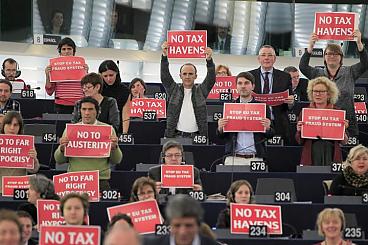Juncker: still doing business with tax havens, just by the back door
Juncker: still doing business with tax havens, just by the back door

In his ‘State of the Union’, European Commission president Jean-Claude Juncker repeated the claim that he was pursing the fight against tax dodging by major corporations. In addition, he advocated a doubling of the European Fund for Strategic Investment, aka the Juncker Fund. Yet now it's precisely via the Juncker Fund that money is finding its way straight to tax havens such as the Cayman Islands. Counter Balance, an organisation which keeps a critical eye on the European Investment Bank (EIB), has published a new report where all of this is explained in great detail. This is a matter on which I'll soon be putting written questions to the Commission. Juncker has some explaing to do.
The Juncker Fund is put to work by the EIB: money from the European Commission and the member states is used by the EIB as base capital in order that more money can then be lent out. This ‘leverage’ effect can be seen in all banks. They 'make' money and if the bodies which receive the money don't go bankrupt, this can go well in the long term. In economic crises it can also go completely wrong, as we have seen in the current crisis. Because the EU and the member states involved act as guarantors, the EIB can do its work of leverage.
From Counter Balance's research it appears that the EIB put a great deal of money into private investment funds. A number of these were registered in countries which are known for their role in tax evasion, such as the Cayman Islands, the Channel Islands and Luxembourg. The EIB is not obliged to give detailed information to the European Parliament on the projects which it finances, directly or indirectly, which means that he EP budgetary control committee can monitor only the bank's administrative expenditure.
The report from Counter Balance shows how vulnerable the EU is. Its reliance on first the EIB, and then on private investment funds which may turn out to be registered in dubious locations, means that anything and everything can go awry. That's why it's important that monitoring of the EIB is far better regulated, even were this to necessitate an amendment to the EU Treaty. Until that time we don't know for sure either what the Commission is doing when, on the one hand, it imposes fines for tax evasion on multinationals such as Apple, while on the other hand next to nothing is being done by the EIB. Here too, transparency is badly needed.
